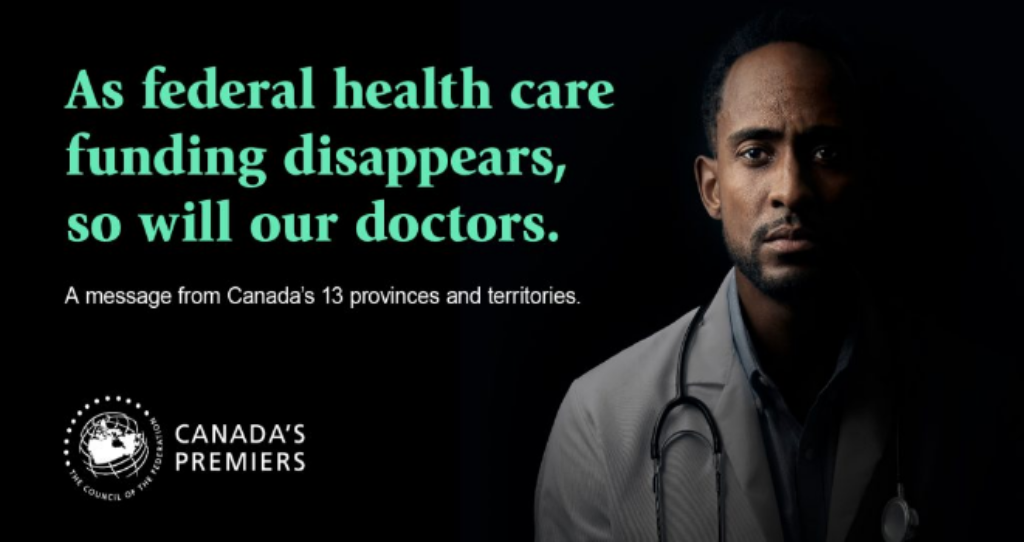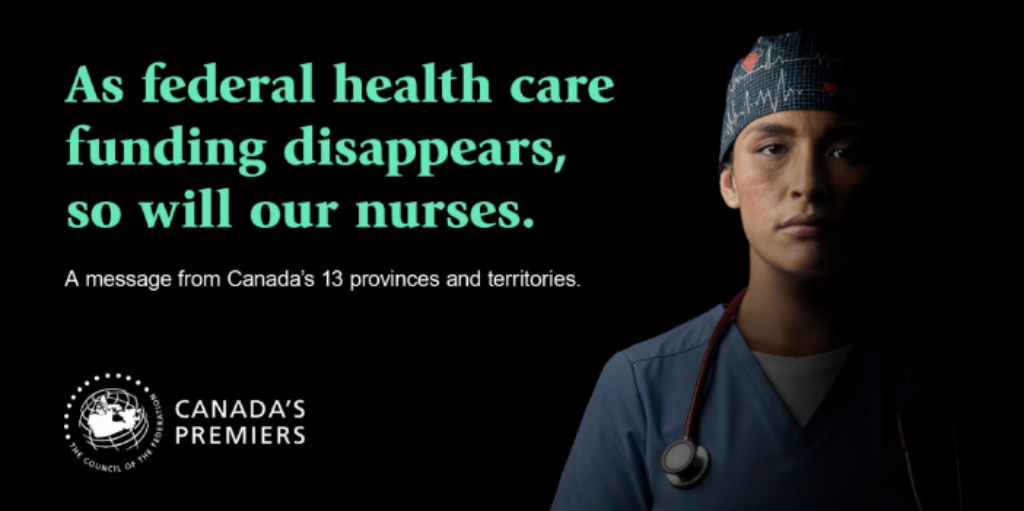The billboards, radio ads and online awareness campaign mounted by the Council of the Federation, (aka the Premiers’ Council) which represents Canada’s 13 provincial and territorial Premier, gets your attention.
The faces of a young doctor and a nurse stare at you sadly, half of their body is fading from view into a void.


The accompanying text pins the blame for the fading presence of doctors and nurses squarely on a disappearing federal government.
The radio ad uses the urgent and persistent voice of a hospital clerk paging a doctor who is needed in the emergency department. In the background you hear the beeping of what sounds like medical equipment tracking a fading heartbeat. The audio fades and the narrator says, “federal funding has fallen to just 22 per cent of the cost of health care and continues to decline. Provinces and Territories are doing their part - but we need the federal government to restore funding now. A message from Canada’s premiers.”
The awareness campaign is contemporary and savvy. The use of young professional health care workers, the notion that health care professionals are disappearing and a doctor being paged repetitively to no avail, hits a familiar chord.
The message is simple. There is a crisis, and the federal government is to blame.
There is an important irony in the Council of the Federation’s campaign, given that the majority of council members are either Progressive Conservative political party leaders or—like Quebec Premier Francois Legault from Quebec and Saskatchewan Premier Scott Moe—represent conservative policy perspectives. There are two leaders who are independents (Northwest Territories and Yukon). One is B.C. NDP Premier David Eby and another is Newfoundland and Labrador Liberal Premier Andrew Furey.
It is as if there is a cluster of dissociative amnesia cases taking place amongst the mostly Conservative members of the Council of the Federation members. After all, it was Stephen Harper’s Conservatives who announced plans in 2011 that they would unilaterally reduce health care funding by $36 billion dollars in 2016.
When the Liberals came to power, then-federal Health Minister Jane Philpott announced that the government would continue on with, and implement, Harper's multi-billion dollar cuts to the health care funding formulae.
It is almost as if the two governing parties were planning to defund the health care system.
Timing is also interesting here.
The Council of the Federation’s self-described “awareness campaign to improve health care for all Canadians” was launched on October 24, 2022, exactly two weeks before face-to-face meeting of federal, provincial and territorial (FPT) ministers of health—the first to take place since 2018.
Expectations were riding high for that meeting.
For the last two years, our health care system has been eroding to the point of collapse. Across Canada, physicians are reporting a doubling of the burnout rates in their profession and nearly a third of nurses plan to leave their current job within the next 12 months.
Canadians lack access to primary care services, emergency departments are being forced to temporarily close due to staffing shortages and a growing number of voices are calling for long-term, systemic solutions.
According to historian and social critic Noam Chomsky, the standard technique of privatization is to defund and make sure things do not work—deliberately—to the point of making people angry. Then hand it over to private capital.
The ongoing health care crisis follows this script with precision.
There is also another irony. On one hand, the awareness campaign asks for a restoration of federal funding and, on the other hand, it advocates for privatization of health care.
Alberta Premier Danielle Smith has spoken about her preference for defunding public healthcare and establishing individual “health care spending accounts.” In November of 2022, the media reported Smith saying “... I recognize we’re going to need more dollars as we go forward, but I don’t think that you want to put more tax dollars in a general pot of money to give to the head of AHS (Alberta Health Services) to have them make decisions about whether or not you get medical treatment. I think we need to create a mechanism where you could put more money in your own account for your own health needs and your family’s health needs, and that’s one way that we can avoid the excessive growth that we’ve seen in health care.”
Manitoba Premier Heather Stefanson's government announced in November its plan to explore using more private partnerships to deliver health care.
Ontario Premier Doug Ford recently announced a plan to permit for-profit surgical and diagnostic centres to operate in Ontario. This scheme offers the dubious rationale that it will reduce wait times and eliminate surgical backlogs. Health experts warn the move will put the squeeze on already taxed publicly funded health care services and further aggravate critical staffing shortages, as health care workers migrate to workplaces that will offer less stressful working conditions and they will not be subjected to Ford’s public sector wage caps.
If the Council of the Federation was genuinely interested in doing its part, as its ad campaign claims, one might have expected the premiers to come to the November 2022 federal-provincial-territorial health ministers’ table ready to embrace concrete measures to genuinely support and recruit much-needed talent into the embattled health care system.
Instead, the Council of the Federation members decided to announce that “no progress” was made at the end of the first day of meetings, prompting the federal health minister to abandon the talks.
Federal Health Minister Jean-Yves Duclos placed the blame on the failure of the FPT meeting squarely at the feet of the premiers and not the health ministers.
Jeremy Nutall, reporting from the Toronto Star wrote, “Duclos told reporters that provincial leaders gave their health ministers ‘marching orders ... forcing my colleagues to speak of one thing and one thing only — money’.”
Duclos continued: “All that the premiers keep saying is that they want an unconditional increase in the Canada Health Transfer sent to their finance ministers. That is not a plan, that is the old way of doing things.
The timing of the Council of the Federation’s awareness campaign and the premiers’ media statement released and uploaded to their webpage—just one day into the FPT meeting—raises questions:
Did the premiers send their health ministers to the table with orders to derail the meeting?
Was there a tactical connection between the awareness campaign pointing the finger for the funding crisis at the federal government and walking out of the FPT meeting?
Was walking out intended to increase the premiers’ leverage at the negotiation table concerning federal health transfers?
Was politicizing the health care crisis intentional and designed to help set the stage for the promotion of privatization initiatives?
CBC reported that copies of the FPT meeting agenda that were circulating on-site showed plans to discuss and, presumably, to approve a health human resources plan that federal and provincial officials had been working on for months prior to the failed November meeting.
An important final question remains unanswered: Did the Council of the Federation opt to politicize the health care crisis rather than engage in dialogue on an action plan to support health care workers and patients across Canada? If so, it’s the premiers who have truly disappeared on the health care file—at a time when strong, coordinated leadership is required to sustain and improve public health care, not tank it.
The upcoming February 7 meeting of Premiers and the Prime Minister to hammer out a health care funding deal, warrants close examination in light of these questions.







